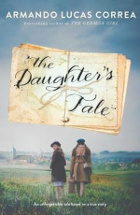The daughter's tale by Armando Lucas Correa

Translated by Nick Caistor. Simon and Schuster, 2019. ISBN:
9781760851248.
Recommended for lovers of historical fiction and students studying
WW2. Themes: Holocaust, WW2, families, resilience. The story opens
in 2015 when Elise Duval who has been living in New York since the
end of the war, is given some letters written by her mother. One of
the letters is from 1939, written on the pages of a book of
botanical illustrations addressed to 'my little Viera'. The story
then shifts further back to Berlin 1933-1939, to a small bookshop
owned by Amanda Sternberg, at a time she had been told to get rid of
books that were 'not sufficiently German'. Her husband, cardiologist
Julius Sternberg is reluctant to leave his patents in Berlin in
spite of increasing anti-Jewish sentiment and they endure the
burning of the bookshop from which Amanda saves just one book, a
French album of hand coloured botanical prints. Meanwhile their two
girls are born, Viera in 1934 and Lina in 1935. As conditions for
Jews deteriorate they miss their opportunity to escape and when
Julius is taken away and dies in 1938 Amanda finds he has put in
place an escape plan and money for her and the children. However,
the plan involves getting tickets on a ship and she is only able to
buy two tickets. At the last moment, instead of sending both
children Amanda decides to just send the older daughter, Viera on
the infamous refugee ship St Louis bound for Cuba where a relative
lives. She flees to France with Lina, finding her way to a family
friend, Claire and her daughter Danielle who take them in. Here
Amanda changes Lina's name to Elise and teaches her to call Claire
'Maman' but they are betrayed and taken to a concentration camp.
Selfless to the last, Amanda manages to smuggle her daughter out of
the camp, back to Claire but they are then caught up in one of the
worst atrocities of WW2, the massacre of Oradour-Sur-Glane in 1944.
That Elise survives yet again is amazing, that she has lived her
life shutting out her wartime experiences is understandable. As the
generation who experienced the horrors of WW2 are no longer able to
bear witness it is important to remember the human cost through the
telling of their stories.
The Daughter's Tale is an unremittingly tragic story of one
mother's resilience and hope for her daughters in the face of
harrowing events. I did find it difficult to keep track of the
characters and there were many threads left dangling. The
descriptive style was not very engaging but that may be due to the
translation.
Sue Speck